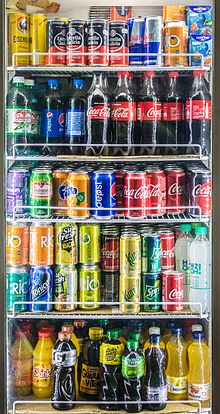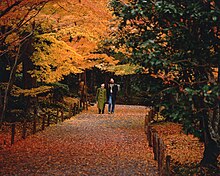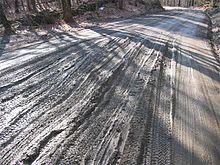American English regional vocabulary
Regional vocabulary within American English varies. Below is a list of lexical differences in vocabulary that are generally associated with a region. A term featured on a list may or may not be found throughout the region concerned, and may or may not be recognized by speakers outside that region. Some terms appear on more than one list.
Regionalisms

Historically, a number of everyday words and expressions used to be characteristic of different dialect areas of the United States, especially the North, the Midland, and the South; many of these terms spread from their area of origin and came to be used throughout the nation. Today many people use these different words for the same object interchangeably, or to distinguish between variations of an object. Such traditional lexical variables include:
- faucet (North) and spigot (South)
- frying pan (North and South, but not Midland), spider (obsolete New England), and skillet (Midland and South)
- gutter (Northeast, South, and West), eaves trough (West and Inland North), and rainspouting (Maryland and Pennsylvania)
- pit (North) and seed (elsewhere)
- teeter-totter (North; widespread), seesaw (South and Midland; now widespread), and dandle (Rhode Island)
- firefly (more Northern and Western) and lightning bug (widespread)
- pail (North, north Midland) and bucket (Midland and South; now widespread)
- sneakers (Northeast and fairly widespread), tennis shoes (widespread outside the Northeast) and gym shoes (Chicago and Cincinnati)
- soda (Northeast, Greater Milwaukee, Great St. Louis, California, and Florida), pop (Inland North, Upper Midwest, and Northwest), coke (South), and tonic (Eastern New England possibility) See also: Names for soft drinks in the United States
- you guys (widespread), y'all (Southern and South Midland), you'uns and yins (Western Pennsylvania), and yous or youse (New York City, Philadelphia, New Jersey, and Northeastern Pennsylvania)
However many differences still hold and mark boundaries between different dialect areas, as shown below. From 2000 to 2005, for instance, The Dialect Survey queried North American English speakers' usage of a variety of linguistic items, including vocabulary items that vary by region. These include:
- generic term for a sweetened carbonated beverage
- drink made with milk and ice cream
- long sandwich that contains cold cuts, lettuce, and so on
- rubber-soled shoes worn in physical education class, for athletic activities, etc.
Below are lists outlining regional vocabularies in the main dialect areas of the United States.
North

- brat or braht – bratwurst
- breezeway (widespread) ("skyway" in Minnesota) – a hallway connecting two buildings
- clout (originally Chicago, now widespread) – political or social influence
- davenport (widespread though uncommon) – a sofa, or couch
- euchre (throughout the North) – card game similar to spades
- fridge (throughout North and West) – refrigerator
- hotdish (esp. Minnesota) – a simple entree cooked in a single dish, related to casserole
- paczki (in Polish settlement areas, esp. Illinois, Michigan, Ohio and Wisconsin) – a jelly doughnut
- pop (North-Central and West) – a soft drink, carbonated soda
- soda (all the Northeast and parts of Wisconsin) – soft drink
- Troll (North-Central) – people who reside in the Lower Peninsula of Michigan
- Yooper (North-Central) – people who reside in the Upper Peninsula of Michigan
- ope – a form of alert or apology used when trying to get around someone or something; E.g. "Ope, let me squeeze right past ya". Ope is most often used in Wisconsin, Michigan, Illinois, and Minnesota.
Northeast

- brook (now widespread but especially common in the Northeast) – creek
- bubbler (esp. New England, Wisconsin and the Mississippi and Ohio river valleys) – a water fountain
- cellar – alternate term for basement
- sneakers (throughout the U.S., though concentrated in the Northeast and parts of Florida) – generic rubber-soled athletic shoe.
- soda – a sweet, carbonated soft drink
- Mischief Night (or, rarer, Cabbage Night) – an annual night when, by custom, preteens and teenagers play pranks; usually, the night before Halloween
New England

- grinder – submarine sandwich
- packie (package store) – a liquor store
- rotary – traffic circle
- tag sale – garage sale
- wicked (all of Massachusetts) – very; an intensifier and adverb, as in wicked cold meaning very cold
Eastern New England
See also: Boston accent
- bulkhead – cellar hatchway
- cabinet (Rhode Island) – milk shake
- frappe – milkshake
- hosey – (rare, but esp. parts of Massachusetts & Maine) to stake a claim or choose sides, to claim ownership of something (sometimes, the front seat of a car)
- intervale – bottomland; mostly historical
- jimmies – sprinkles (ice cream topping) see also Mid-Atlantic, below
- johnnycake (also Rhode Island jonnycake) – a type of cornmeal bread
- leaf peeper – a tourist who has come to see the area's vibrant autumn foliage
- necessary – outhouse, privy
- quahog – pronounced "koe-hog," it properly refers to a specific species of clam but is also applied to any clam
- tonic (eastern Massachusetts) – soft drink
Northern New England

- ayuh – "yes" or affirmative
- creemee – (Vermont) soft serve ice cream
- dooryard – area around the main entry door of a house, specifically a farmhouse. Typically including the driveway and parking area proximal to the house
- Italian (sandwich) – (Maine) submarine sandwich
- logan (also pokelogan) – a shallow, swampy lake or pond (from Algonquian)
- muckle – to grasp, hold-fast, or tear into
- mud season – early spring
Mid-Atlantic
See also: Baltimore accent, Pennsylvania Dutch English, Philadelphia English, and Pittsburgh English
- breezeway – the space between two groups of rowhouses in the middle of a city block
- down the shore – shore areas and beaches of Southern New Jersey
- hoagie – submarine sandwich
- jawn – pronoun used for any person, place, or thing
- jimmies – sprinkles (ice cream topping) see also New England, above
- parlor – living room
- pavement – sidewalk
- shoobie – A visitor to the beach (typically the South Jersey shore) for the day (as contrasted with an overnight visitor)
- water ice – Italian ice
- yo! – Hello; also used to grab someone's attention
- youze – plural form of "you people"
Greater New York City

- bodega – small corner grocery store, from the Spanish word for closet
- catty corner – on an angle to a corner
- dungarees (older) – jeans
- egg cream – a mixture of cold milk, flavored syrup, and seltzer
- have a catch – play catch
- hero – submarine sandwich
- kill – a small river or strait, in the name of specific watercourses; e.g. Beaver Kill, Fresh Kills, Kill Van Kull, Arthur Kill (from Dutch)
- on line – waiting or standing in a line
- potsy – hopscotch
- punchball and stickball – street variants of baseball, suitable for smaller urban areas, in which a fist or stick substitutes for the bat and a "Spaldeen" is the ball
- scallion – spring onion
- stoop – a small porch or steps in front of a building, originally from Dutch
Midland

- barn-burner (now widespread) – an exciting, often high-scoring game, esp. a basketball game
- hoosier (esp. Indiana) – someone from Indiana; (outside of Indiana, esp. in the St. Louis, Missouri area) a person from a rural area, comparable to redneck
- mango – green bell pepper, sometimes also various chili peppers
- outer road – a frontage road or other service road
A soft drink is generally known in the American Midland as pop, except for being soda around Greater St. Louis in Missouri and Illinois, and coke in central Indiana and central and western Oklahoma
South
See also: Southern American English South-
 Chill bumps, goose bumps, or goose pimples?
Chill bumps, goose bumps, or goose pimples?
-
 “We picked up one excellent word – a word worth travelling to New Orleans to get; a nice limber, expressive, handy word – ‘Lagniappe.’ They pronounce it lanny-yap: Mark Twain, Life on the Mississippi
“We picked up one excellent word – a word worth travelling to New Orleans to get; a nice limber, expressive, handy word – ‘Lagniappe.’ They pronounce it lanny-yap: Mark Twain, Life on the Mississippi
- alligator pear – avocado
- banquette (southern Louisiana) – sidewalk, foot-path
- billfold (widespread, but infrequent Northeast, Pacific Northwest) – a man's wallet
- cap (also Midlands) – sir (prob. from "captain")
- chill bumps (also Midlands) – goose bumps
- chuck – toss or throw an object (now somewhat widespread)
- coke – any brand of soft drink
- commode (also Midlands) – bathroom; restroom; particularly the toilet itself
- crocus sack (Atlantic), croker sack (Gulf) – burlap bag
- cut on/off – to turn on/off
- directly – in a minute; soon; presently
- dirty rice (esp. Louisiana) – Cajun rice dish consisting of rice, spices, and meat
- Don't get above your raisin' - regional colloquialism
- fais-dodo (southern Louisiana) – a party
- fix – to get ready, to be on the verge of doing, e.g. "I'm fixing to go"; (widespread but esp. South) to prepare food
- house shoes – bedroom slippers
- lagniappe (Gulf, esp. Louisiana) – a little bit of something extra
- locker (esp. Louisiana) – closet
- make (age) (Gulf, esp. Louisiana) – have a birthday; "He's making 16 tomorrow."
- neutral ground (Louisiana, Mississippi) – median strip
- po' boy (scattered, but esp. South) – a long sandwich, typically made with fried oysters, clams, or shrimp
- put up – put away, put back in its place
- yankee – northerner; also damn yankee, damned yankee
- yonder (esp. rural) – over there, or a long distance away; also over yonder
West

- barrow pit (var. of "borrow pit") - an excavated area where material has been dug for use as fill at another location
- davenport (widespread) – couch or sofa
- hella or hecka (esp. San Francisco Bay Area) – "very" or "a lot of"
- pop (widespread in West and North); soda (predominates in California, Arizona, southern Nevada); coke (in parts of New Mexico and Tucson, Arizona) – sweetened carbonated beverage
- snowmachine (Alaska) – a motor vehicle for travel over snow. Outside Alaska known as a snowmobile
Pacific Northwest
See also: Pacific Northwest English- skid road or skid row – a path made of logs or timbers along which logs are pulled; (widespread) a run-down, impoverished urban area
See also
- American and British English differences section Vocabulary
- General American
- List of dialects of the English language
- Names for soft drinks in the United States
- Sociolinguistics
Notes
- Dictionary of American Regional English. Vol. IV. 2002.
Examples in this section are from this published lexicology from interviews carried out between 1965 and 1970, except where otherwise noted
- Frederic G. Cassidy; Frederic Gomes; Joan Houston Hall, eds. (2002). Dictionary of American Regional English. Vol. IV. Cambridge, Massachusetts: Belknap Press of Harvard University Press.
- Metcalf, Alan A. (2000). How we talk: American regional English today. New York: Houghton Mifflin Harcourt.
- Campbell, Matthew T. (2003). "Generic Names for Soft Drinks By County". Archived from the original on August 11, 2008.
map
References
- Allen, Harold Byron, and Gary N. Underwood (eds). (1971) Readings in American Dialectology. New York: Appleton-Century-Crofts.
- ^ Vaux, Bert Scott A.; Golder; Starr, Rebecca; Bolen, Britt (2005). The Dialect Survey. Archived from the original on April 30, 2016. Retrieved April 30, 2016.
Survey and maps
- Mohr, Howard. (1987) How to Talk Minnesotan: A Visitor's Guide. New York: Penguin.
- Binder, David. (14 September 1995). "Upper Peninsula Journal: Yes, They're Yoopers, and Proud of it." New York Times, section A, page 16.
- "'Ope, sorry!' Where did Midwesterners get this onomatopoeia? Let's ask linguists".
- "Dialect Survey-Level of a building that is partly or entirely underground". University of Wisconsin–Milwaukee. Archived from the original on September 6, 2008. Retrieved June 17, 2008.
- "Dialect Survey – General term for rubber-soled shoes worn for athletic activities, etc". University of Wisconsin–Milwaukee. Archived from the original on August 29, 2008. Retrieved June 17, 2008.
- Bartlett, Ray; Gregor Clark; Dan Eldridge; Brandon Presser (2010). Lonely Planet New England Trips. Lonely Planet. ISBN 978-1-74220-391-1. Retrieved September 4, 2013.
- Collins, Jim (March 2008). "Mud season: New England's fifth season". Yankee. Retrieved September 4, 2013.
- Zielinski, Gregory A.; Keim, Barry D. (2005). New England Weather, New England Climate. UPNE. ISBN 978-1-58465-520-6. Retrieved September 4, 2013.
- ^ Freeman, Amy (March 4, 2015). "Philly Slang: Philadelphia Sayings You Don't Hear Anywhere Else". Caldwell Banker. Retrieved February 12, 2017.
- "WHAT'S THE DIFFERENCE BETWEEN SPRINKLES AND JIMMIES?". Archived from the original on 21 December 2016. Retrieved 12 December 2016.
- "How they Talk in Philadelphia". elliotsamazing.com. Retrieved February 13, 2017.
- Bykofsky, Stu (July 16, 2006). "Philly Slang". PhillyTalk.com. Archived from the original on March 23, 2008.
- "Stoop | Define Stoop at Dictionary.com". Dictionary.reference.com. Retrieved February 1, 2011.
- Martha Barnette; Grant Barrett (January 30, 2015). "Getting Above Your Raisin'". A Way with Words. Wayword, Inc. Retrieved September 27, 2019.
- Wolfram, Walt, and Natalie Schilling-Estes. (2006) American English: dialects and variation second edition. New York: Wiley-Blackwell.
- "Definition of BARROW". www.merriam-webster.com. Retrieved November 9, 2020.
- Eghan, Adizah (August 2015). "The Origins of Hella". KQED. Archived from the original on September 23, 2015. Retrieved November 18, 2015.
- Labov, William; Ash, Sharon; Boberg, Charles (2006). The Atlas of North American English. Berlin: Mouton-de Gruyter. p. 289. ISBN 3-11-016746-8.
- ^ Oxford English Dictionary Second Edition. Oxford: Oxford University Press, 1989.
External links
- www
.daredictionary .com - NY Times dialect quiz
- "City Dictionary User-generated dictionaries for regional language in the United States". Archived from the original on July 23, 2018.
| Dialects and accents of Modern English by continent | |||||||||||||||||||
|---|---|---|---|---|---|---|---|---|---|---|---|---|---|---|---|---|---|---|---|
| Europe |
| ||||||||||||||||||
| Americas |
| ||||||||||||||||||
| Oceania |
| ||||||||||||||||||
| Africa | |||||||||||||||||||
| Asia |
| ||||||||||||||||||
| Related |
| ||||||||||||||||||

